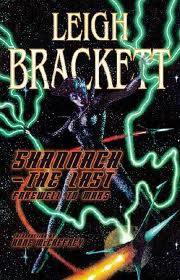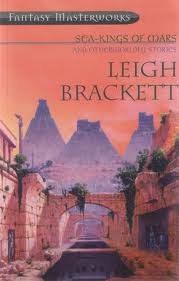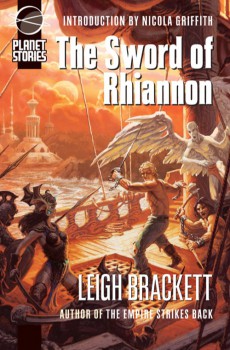Leigh Brackett: American Writer

This 4th of July I thought I’d take a look at one of my very favorite writers, the late, great Leigh Brackett, queen of planetary adventure.
Only a few generations ago planetary adventure fiction had a few givens. First, it usually took place in our own solar system. Second, our own solar system was stuffed with inhabitable planets. Everyone knew that Mercury baked on one side and froze on the other, but a narrow twilight band existed between the two extremes where life might thrive. Venus was hot and swampy, like prehistoric Earth had been, and Mars was a faded and dying world kept alive by the extensive canals that brought water down from the ice caps.
To enjoy Brackett, you have to get over the fact that none of this is real — which really shouldn’t be hard if you enjoy reading about vampires, telepaths, and dragons, but hey, there you go. Yeah, Mars doesn’t have a breathable atmosphere, or canals, or ancient races. If you don’t read her because you can’t get past that, you’re a fuddy duddy and probably don’t like ice cream.
A few of Brackett’s finest stories were set on Venus, but it was Mars that she made her own, with vivid, crackling prose.
Here. Try this, the opening of one of her best, “The Last Days of Shandakor.” You can find it in two of the three books featured as illustrations in this article, Shannach — the Last: Farwell to Mars, and Sea-Kings of Mars and Otherworldly Stories.
Anyway. On to Brackett.
He came alone into the wineshop, wrapped in a dark red cloak, with the cowl drawn over his head. He stood for a moment by the doorway and one of the slim dark predatory women who live in those places went to him, with a silvery chiming from the little bells that were almost all she wore.
I saw her smile up at him. And then, suddenly, the smile became fixed and something happened to her eyes. She was no longer looking at the cloaked man but through him. In the oddest fashion — it was as though he had become invisible.

She went by him. Whether she passed some word along or not I couldn’t tell but an empty space widened around the stranger. And no one looked at him. They did not avoid looking at him. They simply refused to see him.
He began to walk slowly across the crowded room. He was very tall and he moved with a fluid, powerful grace that was beautiful to watch. People drifted out of his way, not seeming to, but doing it. The air was thick with nameless smells, shrill with the laughter of women.
Two tall barbarians, far gone in wine, were carrying on some intertribal feud and the yelling crowd had made room for them to fight. There was a silver pipe and a drum and a double-banked harp making old wild music. Lithe brown bodies leaped and whirled through the laughter and the shouting and the smoke.
The stranger walked through all this, alone, untouched, unseen. He passed close to where I sat. Perhaps because I, of all the people in that place, not only saw him but stared at him, he gave me a glance of black eyes from under the shadow of his cowl — eyes like brown coals, bright with suffering and rage.
I caught only a glimpse of his muffled face. The merest glimpse — but that was enough. Why did he have to show his face to me in that wineshop in Barrakesh?
He passed on. There was no space in the shadowy corner where he went but space was made, a circle of it, a moat between the stranger and the crowd. He sat down. I saw him lay a coin on the outer edge of the table. Presently a serving wench came up, picked up the coin and set down a cup of wine. But it was as if she waited on an empty table.
I turned to Kardak, my head drover, a Shunni with massive shoulders and uncut hair braided in an intricate tribal knot. “What’s that all about?” I asked.

Kardak shrugged. “Who knows.” He started to rise. “Come, JonRoss. It is time we got back to the serai.”
“We’re not leaving for hours yet. And don’t lie to me, I’ve been on Mars a long time. What is that man? Where does he come from?”
Barrakesh is the gateway between north and south. Long ago, when there were oceans in equatorial and southern Mars, when Valkis and Jekkara were proud seats of empire and not thieves’ dens, here on the edge of the northern Drylands the great caravans had come and gone to Barrakesh for a thousand thousand years. It is a place of strangers.
In the time-eaten streets of rock you see tall Kesh hillmen, nomads from the high plains of Upper Shun, lean dark men from the south who barter away the loot of forgotten tombs and temples, cosmopolitan sophisticates up from Kahora and the trade cities, where there are spaceports and all the appurtenances of modern civilization.
The red-cloaked stranger was none of these.
Now it’s possible that you’re a perfectly fine human being if you didn’t find that stirring, but my guess is that if it didn’t interest you at least a little to find out who that stranger was, you’re no fan of adventure fiction. Leigh Bracket was, simply, a master writer. Find her work, read it, and get swept away.
Howard Andrew Jones is the author of the historical fantasy novels The Desert of Souls, and the forthcoming The Bones of the Old Ones, as well as the related short story collection The Waters of Eternity, and the Paizo Pathfinder novel Plague of Shadows. You can keep up with him at his website, www.howardandrewjones.com, and keep up with him on Twitter or follow his occasional meanderings on Facebook.
Brackett’s prose is second to none. Her Eric John Stark stories are moody and evocative. There is a two-fisted kind of toughness to her work that also shows up in her crime and Western writing.
I think it’s worth noting that Brackett was a talented screenwriter, too, working on a number of well-known movies. The best of these would be The Big Sleep. She also was hired by George Lucas to write The Empire Strikes Back, and apparently delivered a draft shortly before her death in 1978. She does receive a screenwriting credit along with Lawrence Kasdan.
JL Black “Empire Strikes Back” is my favorite episode of Stars Wars and the best written IMO.
Howard, Not only was Leigh Brackett a good fiction fantasy writer, I shall always be a fan of hers thanks to the powerful introduction she wrote regarding Robert E. Howard’s heroine Agnes de Chastillon, Dark Agnes, in the 1977 Zebra edition of The Sword Woman. Not only does Leigh write of the woman’s traditional role “…a man’s daughter was a saleable commodity, to be auctioned for the best price she could fetch,” she responds to statements “..but no woman could really be physically capable of doing these things”:
Queen Boudicca led her armies to battle. The white armed German women fought alongside their men and frightened the wits out of the Roman legionnaires. The Vikings had their shield-maidens and even after the advent of Christianity, exceptional women continued to break out of the trap. They have served honorably as pirates and freebooters, but they were all good women of their hands with sword and pistol. The women who helped to open up the far places of the world were not made of custard. They could shoot a rifle and hit what they aimed at. They could withstand heat and cold, hunger, thirst and the ever-present threat of death quite as well as their husbands. Never underestimate the power of a woman.
(By the way, Howard, I would also like to add that I enjoyed your article “Howard’s Journey” which appeared in the Appendices of Del Rey’s edition of The Sword Woman and Other Historical Adventures. I thought your analysis of REH’s historical adventures was well done. Both you and Scott Oden in his Introduction to the book gave this reader added insights into Howard’s stories.)
JL, I love Brackett’s Eric John Star stories. There are some great anecdotes about Brackett’s work writing screenplays, and her interactions with Bogey and the Duke. I always mention The Empire Strikes Back as one of the last things she wrote because it’s a good shorthand way to describe the sort of thing her prose was doing for thirty years prior. Nowadays I compare her work, with its down and out spacers and noir sensibilities, to Firefly.
However, Stephen Haffner of Haffner Press, who’s read Brackett’s script, has told me little to nothing of her original screenplay made it into the final draft. It doesn’t change the fact that Empire FEELS like Brackett.
I absolutely love almost every one of Brackett’s stories of Mars. The haunting atmosphere, the evocative details she provides about the scenery, the sense of the ineffable antiquity of the cities and landscapes. I hope some day I shall learn to write that well.
Barb, thanks for the kind words about my words on Robert E. Howard’s historicals. Those are great stories, and yet I still don’t hear much talk about them, no matter their easy accessibility through those Del Rey imprints.
Back to Leigh Brackett, as you mention, she could write passionately in defense of the kind of fiction she loved. I wish she’d been able to edit more than one of those “Best of Planet Stories” collections, because her introductions were always good reading.
I have nothing else to say except that Leigh Brackett is a literary treasure and one of the greatest authors whoever lived. Thanks Howard for reminding us of this.
You remind me that I desperately need to sit down and read those Haffner collections one of these days. Not quite yet, though — I just finished a run through Barsoom so I think I need some space between the two of them.
Howard, thanks for the post and the quote. I was about 13 when I discovered Brackett (about two months after I discovered Kuttner and Moore). My mind was permanently warped, in a good way. It’s been a while since I dove deep into her work, and you’ve reminded me why I need to again. She’s one of only four writers who have shelves dedicated to them in my library rather than being mixed in with everyone else. The others are Bradbury, Howard, and Kuttner/Moore, who collaborated so much I keep them together.
Those of us who love this type of fiction owe Stephen Haffner a debt for collecting so much hard to find work in beautiful editions.
Keith, I have a lot of shelf space divided to Leigh Brackett as well, including a half shelf with some old paperbacks, and a big spot with some of the Paizo Planet Stories line, the Haffner books, the Skaith onmibus, the Fantasy Masterworks collection (starting to look dog-eared) and the Best of Leigh Brackett book edited by her husband.
I keep having to buy little paperbacks of The Sword of Rhiannon, because it never comes back when I loan it out. It’s in the Fantasy Masterworks omnibus, but the typos in the story in that edition drive me nuts.
And I thoroughly agree with you that we owe Haffner a debt for these Brackett books, not to mention many others in a similar vein. I hope that the Planet Stories imprint will survive and give a new generation access to these as well.
I see that Baen has a bunch of Brackett ebooks, including Sword of Rhiannon and several short story collections, although I’m not sure how comprehensive they are.
It’d be great if Haffner or somebody could also put out collections of her novels.
And I join you in wishing for Planet Stories’ continued survival.
Joe, I didn’t know about BAEN’s e-books. That’s really good news, and ups the chance that a new generation will read her work.
I discovered Leigh Brackett just a couple of years ago. What a revelation she was. So far, The People of the Talisman is my favorite, but I’m still just making her acquaintance.
When I came across these retro faux travel posters for the solar system, I thought immediately of Brackett. It’s art nouveau planetary romance.
Joe,
Thanks for the head’s up on the Baen books. I tracked them down on Baen’s wesbite — looks like they’re all digital volumes:
http://www.baenebooks.com/s-139-leigh-brackett.aspx
I count 15 of them. A nice collection, although they’re a little pricey ($32 for the Stark volume, for example)
John,
Well, the Stark collection is 8 separate volumes, and the individual volumes are $4 each (including two by Edmond Hamilton), so the math works out. The other collection (The Solar System) actually gives you 7 books for $20, so you’re getting a bit of a discount from the 4-per-book rate.
On a completely random note (too early; not enough coffee) I’d love to have seen Brackett do a collection of stories in the Firefly universe.
Joe
About the Empire Strikes Back screenplay, I have to say that if little to nothing of Brackett’s script made it into the final product, then that means George Lucas provided her with a very detailed plot outline for her to follow, because while virtually none of her dialogue was used (I think Brackett must have felt Star Wars was more juvenile than most people, because the dialogue she used felt over-explanatory in the way you might use for very young children), the structure of the final film is apparent in the script. The battle on the ice planet, Luke being directed by Obi Wan to meet a new dwarfish mentor on a jungle planet, Han and Leia flying around trying to escape the Empire, the cloud city…it’s all there in her draft.
[…] first is about Leigh Brackett, and features a lengthy excerpt from the opening of one of her fine sword-and-planet stories so interested folks can see why […]
[…] discovered this next story about Mars thanks to the Howard Andrew Jones’ Black Gate article: “Leigh Bracket: American Writer.” After I read his introduction to “The Last Days of Shandakor” I decided to take up his […]
[…] about why I love the work of Harold Lamb. Here’s why I love the fiction of Roger Zelazny, and Leigh Brackett. I’d think it was a given that I loved the work of Robert E. Howard, but here’s several […]
[…] Leigh Brackett: American Writer, by Howard Andrew Jones Masterpiece: The Sword of Rhiannon by Leigh Brackett by Ryan Harvey Swordsmen in the Sky by Charles Saunders A Bout of Aboutness: Urban Fantasy and Sword-and-Planet by James Enge An Interview With Paizo publisher Erik Mona by Howard Andrew Jones […]
[…] Terror in the House: The Early Kuttner, Volume One, and Thunder in the Void; Leigh Brackett’s Shannach – The Last: Farewell to Mars; and Robert Silverberg’s Tales From Super-Science Fiction — are some of the most collectible […]
[…] Terror in the House: The Early Kuttner, Volume One, and Thunder in the Void; Leigh Brackett’s Shannach – The Last: Farewell to Mars; and Robert Silverberg’s Tales From Super-Science Fiction — are some of the most collectible […]
[…] Edmond Hamilton, Henry Kuttner and C.L. Moore’s Detour to Otherness, Leigh Brackett’s Shannach — the Last: Farwell to Mars, Henry Kuttner’s Thunder in the Void and Terror in the House, Robert Silverberg’s Tales […]
[…] We last looked at Leigh Brackett in the final installment of our Advanced Readings in D&D recap, Leigh Brackett, J.R.R. Tolkien, and Appendix N, Ryan Harvey’s review of another Planet Stories volume, Masterpiece: The Sword of Rhiannon by Leigh Brackett, and Howard Andrew Jones’ retrospective, Leigh Brackett: American Writer. […]
[…] and wanted to try my hand at something similar. I’ve written variously about Harold Lamb and Leigh Brackett and Robert E. Howard and Fritz Leiber and Roger Zelazny and many others, and you can feel free to […]